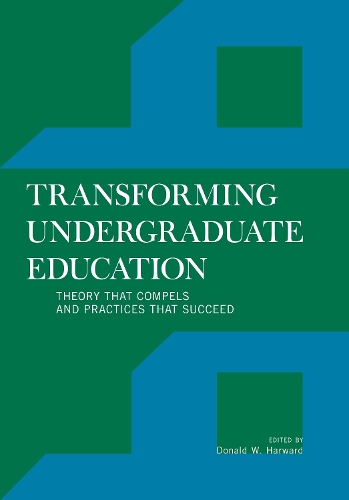
Transforming Undergraduate Education: Theory that Compels and Practices that Succeed
(Paperback)
Publishing Details
Transforming Undergraduate Education: Theory that Compels and Practices that Succeed
By (Author) Donald W. Harward
Contributions by Jann H. Adams
Contributions by Jerzy Axer
Contributions by Kenneth R. Bain
Contributions by Randall J. Bass
Contributions by Thomas Bender
Contributions by Dessa Bergen-Cico
Contributions by Joyce A. Bylander
Contributions by Kent John Chabotar
Contributions by Barry N. Checkoway
Bloomsbury Publishing PLC
Rowman & Littlefield Publishers
8th November 2017
United States
Classifications
Tertiary Education
Non Fiction
Curriculum planning and development
Educational strategies and policy
Higher education, tertiary education
Teacher training
378.154
Physical Properties
Paperback
432
Width 160mm, Height 251mm, Spine 29mm
712g
Description
For those ready to participate in making transformative changes, Transforming Undergraduate Education provides evidence and case studies that suggest how steps can be taken and progress made. For those who are currently leading their campuses through a change in culture, this book offers support and encouragement. And for those who are pausing looking positively but cautiously at what needs to change at the prospects and challenges that may be encountered, Harward and the collection of authors offer an invaluable and innovative resource. Given the intensity of interest regarding the problems in higher education, Harward notes how the systemic sources of those problems are infrequently addressed and even rarer is the offering of solutions or suggestions for positive actions. Harward and his colleagues see the achievement of this book as doing both understanding the problems and offering solutions. The book assembles the voices of leaders, scholars, practitioners, critics and others committed to higher education; collectively they combine theoretical considerations with analyses of fundamental issues related to learning and liberal education. The resulting arguments, theories, and evidence are sufficient to encourage significant transformative changes in higher education. Contributors offer examples of campus initiatives that document such changes, from directional nudges to major shifts of emphases and resources from theoretical arguments to case studies and practices that suggest and guide constructive steps in efforts at change.
Reviews
Ambitious in purpose and scope, this volume weaves together pithy insights from a stellar cast of contributors along with instructive institutional examples to explain how colleges can help undergraduates learn what they need to know and do to survive and thrive in the 21st century. -- George D. Kuh, Chancellors Professor Emeritus, Indiana University
This important volume focuses on the fundamental challenge of undergraduate education: How can we create environments for deep learning that will flourish and last a lifetime How can we help students understand themselves and others in ways that will liberate and strengthen them for creative, responsible, and meaningful lives The authors draw upon history, theory, and years of research to propose changes in campus cultures, structures, and practices. This is a transformative book, a must-read for anyone who cares about the current and future state of higher education. -- Nancy Cantor, chancellor and president, Syracuse University
Harward and his collaborators have constructed an up-to-the-minute account of the problems we struggle with in American higher education. Contemporary, nationally recognized experts contribute chapters on students' mental health, the challenges of delivering engaging, integrated educational experiences in an era of student mobility, and the new urgency of longstanding imperatives like faculty leadership, student success, and civic engagement. Yet the authors anchor their stories in the universal traditions and purposes of liberal learning, making the book both timely and enduring. This is the kind of resource that will quickly bring the newcomer up to speed, while serving as a helpful reference for all of us for years to come. -- Kenneth O'Donnell, associate dean, California State University
Consider this a primer for liberal education in the 21st century. By gathering together the thoughts of some of the most important current thinkers on higher education into one volume, Harward and his collaborators have sketched an exciting vision of educational excellence for our time. This collection should be read by educators, policy makers, parents of college-age children, and anyone else who cares about the future of higher education in this country. -- George J. Sanchez, Dornsife College vice dean for Diversity and Strategic Initiatives, University of Southern California
Don Harward and Ashley Finley have edited a compelling volume that will be of interest to faculty members and academic administrators seeking to create engaging environments for undergraduate education in order to prepare students for lives of meaning and success in a complex world. -- Leo M. Lambert, president, Elon University
The most pervasive argument of the authors of this edited volume is that improving undergraduate education is about creating a collegiate environment that intellectually engages students....This volume should be of special interest to administrators and faculty members who are considering changes in how their colleges and universities deal with undergraduate students. Faculty members in psychology departments will learn some new ideas and will also see much of the work they have been doing affirmed. Of special importance is the advice given about how to organize connections between students lives inside and outside the classroom. The idea of bridging theory and practice is a good one. * PsycCRITIQUES *
Author Bio
Donald W. Harward is President Emeritus of Bates College in Lewiston, Maine. Since 2002, when he founded the Bringing Theory to Practice Project, he has been its Director, working with more than 200 colleges and universities that have been involved and have received grants from the Project. He is also a Senior Fellow with the Association of American Colleges and Universities.
